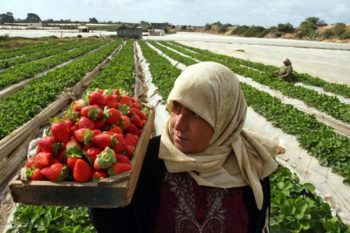
Egypt is looking to reverse a series of bans on its agricultural products that has hit one of its most promising export sectors, Abdel Hamid al-Demerdash, the head of Egypt’s Agriculture Export Council said.
Egyptian crops from strawberries to peppers have been hit by temporary bans in Saudi Arabia and the United Arab Emirates on concerns over pesticides residues. Sudan introduced a blanket ban in May on agricultural products from Egypt.
Agricultural exports were expected to increase significantly this year after Egypt floated its pound currency in November, roughly halving its value and making goods relatively cheap for foreign buyers.
But Demerdash put sales from the export season, which is set to end this month, at about $2.1 billion, down from $2.2 billion last year. Egypt’s agricultural export season runs from September through August.
Arab countries have requested that Egypt establish a “whitelist” of approved exporters who can guarantee the safety of their products, said Demerdash, whose council is working with the government to set it up.
“There is going to be an official Egyptian delegation visiting the countries which have banned the goods. We hope that these countries return to importing from Egypt before the beginning of the new export season,” said Demerdash, who represents about 1200 Egyptian agricultural exporters.
Egypt exports about 1.8 million tonnes of fruit per year and 1.4 million tonnes of vegetables, making agricultural products one its largest export sectors at about 10 percent of total exports. The country has a gaping trade deficit that stood at $42.64 billion last year.
That deficit has been narrowing in the past few months on the back of a large decline in imports, though export growth remains modest at just 8 percent in the first half of 2017.
“We’re working on opening new export markets in Asia and Africa and we will be making several visits to countries there, in addition to opening markets for grapes in Canada and Australia,” said Demerdash.
Copyright Ships & Ports Ltd. Permission to use quotations from this article is granted subject to appropriate credit given to www.shipsandports.com.ng as the source.